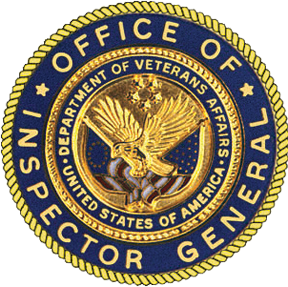Inspection of Select Vet Centers in Continental District 4 Zone 1
Report Information
Summary
The VA Office of Inspector General (OIG) Vet Center Inspection Program provides a focused evaluation of aspects of the quality of care delivered at vet centers. The OIG inspected six randomly selected vet centers throughout Continental district 4 zone 1: Fort Collins, Colorado; Kalispell, Montana; Tulsa, Oklahoma; Abilene, Texas; Salt Lake City, Utah; and Cheyenne, Wyoming.
The OIG inspection focused on four review areas: suicide prevention; consultation, supervision, and training; outreach; and environment of care. In the suicide prevention review, the OIG team evaluated vet center staff participation in VA medical facility mental health executive council meetings resulting in one recommendation across five of the six vet centers inspected. The consultation, supervision, and training review identified concerns with external clinical consultation, monthly client record reviews, and completion of select trainings resulting in three recommendations across all six vet centers inspected. The outreach review evaluated outreach plan completion, inclusion of strategic components, and tailoring of outreach activities to cultural background information identified in the plan which resulted in one recommendation across all six vet centers inspected. The environment of care review evaluated vet centers’ physical environment and general safety resulting in eight recommendations across five of the six vet centers inspected.
The OIG issued a total of 13 recommendations for improvement.
District leaders and the Fort Collins, Kalispell, Abilene, Salt Lake City, and Cheyenne Vet Center Directors collaborate with the support VA medical facility to determine reasons for noncompliance with staff participation on the mental health executive council, take action as indicated, and monitor compliance.
District leaders and the Fort Collins, Tulsa, Abilene, Salt Lake City, and Cheyenne Vet Center Directors determine reasons for noncompliance with completing four hours of external clinical consultation for clinically complex cases per month, ensure a process is implemented, and monitor compliance.
District leaders and the Fort Collins, Abilene, and Salt Lake City Vet Centers Directors determine reasons for noncompliance with Vet Center Directors review of 10 percent of active client records monthly for each counselor’s caseload, ensure completion, and monitor compliance.
District leaders and the Fort Collins, Kalispell, Tulsa, Abilene, Salt Lake City, and Cheyenne Vet Center Directors determine reasons for noncompliance with employees completing select trainings in the required time frame, ensure completion, and monitor compliance.
District leaders and the Fort Collins, Kalispell, Tulsa, Abilene, Salt Lake City, and Cheyenne Vet Center Directors determine reasons for noncompliance with completion of an outreach plan with all required strategic components, ensure completion, and monitor compliance.
District leaders and the Cheyenne Vet Center Director determine reasons for noncompliance with completion of an annual fire or safety inspection, ensure completion, and monitor compliance.
District leaders and the Abilene and Cheyenne Vet Center Directors determine reasons for noncompliance with having an annual risk and vulnerability assessment completed by VA police or local law enforcement, ensure completion, and monitor compliance.
District leaders and the Fort Collins and Kalispell Vet Center Directors determine reasons for noncompliance with monthly fire extinguisher inspections, ensure completion, and monitor compliance.
District leaders and the Salt Lake City Vet Center Director determine reasons for noncompliance with annual fire extinguisher servicing, ensure completion, and monitor compliance.
District leaders and the Fort Collins, Kalispell, Abilene, Salt Lake City, and Cheyenne Vet Center Directors determine reasons for noncompliance with monthly automated external defibrillator inspections, ensure completion, and monitor compliance.
District leaders and the Salt Lake City Vet Center Director determine reasons for noncompliance with annual automated external defibrillator servicing by VA medical center biomedical engineering, ensure completion, and monitor compliance.
District leaders and the Cheyenne Vet Center Director determine reasons for noncompliance with building evacuation plans posted in a communal area for staff and visitors, ensure completion, and monitor compliance.
District leaders and the Fort Collins Vet Center Director determine reasons for noncompliance with a desktop reference sheet outlining steps for ancillary office staff to follow in case of a suicidal or homicidal client, ensure completion, and monitor compliance.
